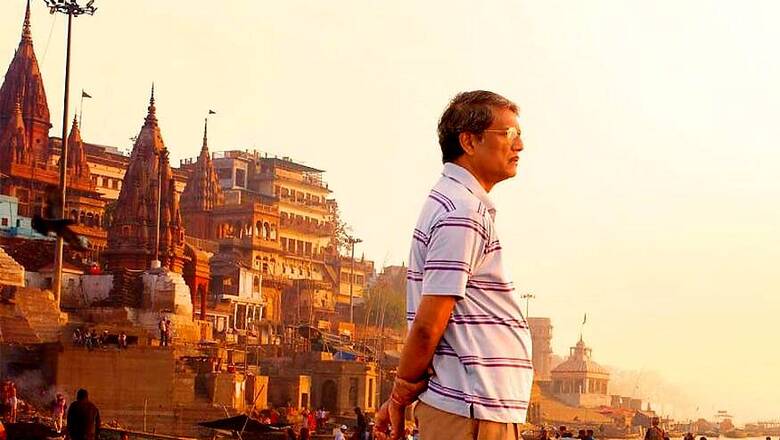
views
Cast: Lalit Behl, Adil Hussain, Geetanjali Kulkarni, Palomi Ghosh, Navnindra Behl, Anil K Rastogi
Director: Shubhashish Bhutiani
The notion that the highest level of being is all about freeing yourself from the transient human life runs through Hinduism, much like other religions. And this idea of the breakout from the worldly pleasures which is called moksha becomes the core concept of Shubhashish Bhutiani’s debut feature Mukti Bhawan.
Set in Varanasi, the film revolves around a 77-year-old Dayanand Kumar (Lalit Behl) who announces to his family while having a meal that his time to die has arrived, and that he’d want to visit Varanasi for his last journey. This decision, quite clearly leaves his son Rajeev (Adil Hussain), Rajeev’s wife Lata (Geetanjali) and daughter Sunita (Palomi Ghosh) in a state of shock. And because Rajeev can’t let his father visit Varanasi alone, he – despite a hectic work life – decides to accompany him.
The sacredness of quaint Varanasi is obvious from the fact that the city on the Ganges is the best place to attain moksha, or as many call it ‘release’ at the moment of death. As Kumar prepares himself for the release from the cycle of life, death and reincarnation by breathing his last in Varanasi, he decides to check in to a moksha retirement lodge.
But attaining salvation comes with its own terms and conditions. Kumar is initially not allowed to stay beyond 15 days. So if he doesn’t die within the aforementioned time frame, he will be asked to vacate the room to make it available for other ‘dying’ visitors. While this remains the key rule, the manager doesn’t really adhere to it. Just when the time limit expires, the manager informs Rajeev, desperate to take his father back home, that he doesn’t have the right to ask a ‘dying’ guest to vacate. This further makes it incumbent for Rajeev to leave his father in Varanasi and join work and family.
Director Bhutiani does an amazing job in capturing the essence of the spiritual power of the city. From taking shots of a group of people crooning bhajans to displaying bodies tied to bamboo frame being carried on willing shoulders to focusing the varied moods of faith - Bhutiani does it all in the most real way. In a nutshell, he explores the long association with death in a way that will remain with you for the longest time.
What also works for Mukti Bhawan is the sensitivity and warmth with which Bhutiani handles the relationship that a busy son shares with a father awaiting his death. What makes the relationship even more interesting is the manner in which it evolves. From being compelled to arrange milk from a buffalo dairy to being made to sit up straight while sleeping to get water for his father, the dutiful and compliant son Rajeev shoulders his responsibility with utmost seriousness. It is a delight to see Bhutiani explain the complexities involved in their relationship, and also tackle the issues they’ve faced in the most genuine way.
In fact, there is a sequence wherein Kumar expresses his desire to be a kangaroo in his next life. The reason? Well, ‘kyunki unki pocket hoti hain aur mai saari cheezein pocket mei rakhunga,’ Kumar chuckles. This is the moment when we realize that even though this father-son relationship appears intense and dynamic, there are humorous moments to be found as well. And cry too!
Behl was last seen essaying the role of a father in Titli, which offered a disturbing story on Delhi’s underbelly. Even though he essays the same role, the understanding and depiction of the stormy relationship he shares with his son needs to be lauded. Even as he waits for salvation in a dingy room in Varanasi, he socializes with friends over meals and bhajans. In fact, his death unties Rajeev with his daughter Sunita. And the message ‘Karo wahi jo mann ko bhaye’ that he shares with Sunita also comes across as the greater truth because there is nothing more important than following your heart and never have regrets.
After leaving an indelible impact in films which are as diverse as Ishqiya, Parched, Life of Pi and English Vinglish, Hussain plays a role of a docile son battling his father’s attempts to attain salvation with maturity. Since he gets so deep into it, he doesn’t face any problem in losing his self in the role. Geetanjali and Palomi Ghosh also play their parts well.
At a time when being different isn’t taboo in Bollywood, we are happy that Bhutiani takes up a topic that we are aware of, but not explored much in movies. While the film will definitely find several takers especially amongst the older generation, it will also resonate with the youngsters. For, here’s a theme that nobody irrespective of their age group can’t avoid.
Rating: 4/5



















Comments
0 comment